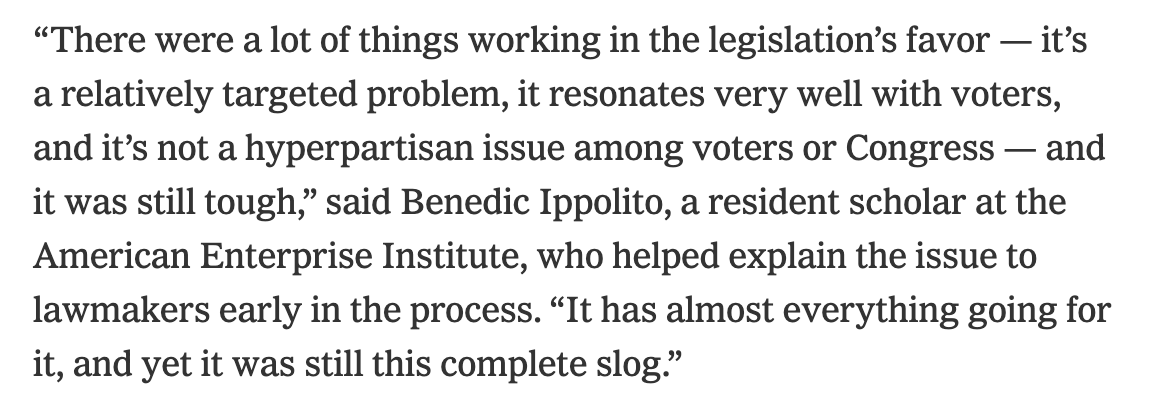An end to most surprise medical bills is finally coming. https://www.nytimes.com/2020/12/20/upshot/surprise-medical-bills-congress-ban.html with @sarahkliff
Surprise medical billing was a weird Washington issue. Both parties wanted it fixed. Voters wanted it fixed. There was strong research describing the problem and several targeted solutions. The fact it took two years is instructive. @ben_ippolito:
There are basically conflicting ways of thinking about this, and both are sort of true.
1) The challenges show how powerful big health care lobbies really are in Washington. Here's mine on that theme from last year. https://www.nytimes.com/2019/12/17/upshot/surprise-billing-democrats-2020.html
1) The challenges show how powerful big health care lobbies really are in Washington. Here's mine on that theme from last year. https://www.nytimes.com/2019/12/17/upshot/surprise-billing-democrats-2020.html
2) The old, collaborative, iterative way of Congressional work, with hearings and committee markups and bipartisan dealmaking, and little tweaks and improvements along the way, worked to produce legislation that everyone could embrace, albeit slowly. https://www.nytimes.com/2020/12/20/upshot/surprise-medical-bills-congress-ban.html
For patients, this reform means they will never have to worry about going to an emergency room, getting care from a doctor, and receiving an unexpected bill. (Starting next year.) https://www.nytimes.com/2020/12/20/upshot/surprise-medical-bills-congress-ban.html
It also will protect them from the often enormous surprise bills from air ambulances. @uwsgeezer's story from 2015 still sticks with me. https://www.nytimes.com/2015/05/06/business/rescued-by-an-air-ambulance-but-stunned-at-the-sky-high-bill.html
But the bill does not include ground ambulances, a major source of surprise bills. Whole other fascinating lobbying story there! https://www.nytimes.com/2019/07/22/upshot/ambulance-surprise-medical-bills-law.html @sarahkliff
Ok, a few more policy details, for the nerds like me.
The big fight in Washington has been about what to do when an insurance company and an out-of-network provider can't agree on a price. Here's my (old) rundown of the options. https://www.nytimes.com/2019/05/24/upshot/surprise-medical-bills-bipartisan-lawmaking.html
One option was to force hospitals to solve the problem by requiring that doctors who worked there would sign contracts with all the same insurance plans. That one got little traction.
Another was to establish a "benchmark" payment in cases where negotiations failed. That approach was at the core of the bill that did not pass last year.
The third was to send insurers and providers to an outside arbiter, who would receive one offer from each side, review some outside information, and pick the fairer price. That's what the final bill does.
In general, insurers and employer groups, who pay the bill, preferred the benchmark approach. Doctors and hospitals, who get paid, liked the arbitration approach.
But, as several academics noted at the start of this debate, it's not really clear that the two approaches will make a big difference in final prices. Arbiters are going to figure out some system for what they think is fair, and that will probably come to resemble a benchmark.
So the last round of lobbying was all about what information the arbiters could consider. The docs and hospitals wanted them to look at the sticker prices for care, which almost no one pays. The insurers and employers wanted them to look at public payment rates, such as Medicare.
Congress split the baby: Arbiters can't consider either charges or Medicare rates.
But they are encouraged to look at "median in-network rates." That's the same amount that was used as the benchmark in the previous bill.
But they are encouraged to look at "median in-network rates." That's the same amount that was used as the benchmark in the previous bill.
Arbitration involves more cost, obviously, because someone has to pay the arbiter. But the evidence from states that have set up similar systems is that, once parties know the arbiter's benchmark, they tend to settle most claims and skip arbitration.
Important caveat to all of these tweets: The omnibus bill including this legislation has not passed yet, but is expected to. If things change at the eleventh hour (not unprecedented), we will update you.
In the meantime, here's our article about the legislation and it's long, difficult gestation. https://www.nytimes.com/2020/12/20/upshot/surprise-medical-bills-congress-ban.html @sarahkliff

 Read on Twitter
Read on Twitter



